Wednesday, July 4th 2018

TechPowerUp Processor Survey Results: The Ryzen Effect is Real
Late May 2018, TechPowerUp started a front-page poll asking people which processor they use. 37 days and 16,140 responses later, we have a general idea of where the desktop processor market stands among our readers (predominantly PC gamers and enthusiasts). The top-two responses to our survey were 4th generation Core "Haswell," followed by the preceding two generations ("Ivy Bridge" and "Sandy Bridge"). This speaks volumes as to the hole Intel dug itself into, due to lack of competition from AMD. Processors that are 4-7 years old still run today's gaming PCs, and don't bottleneck today's games, as long as graphics cards keep getting faster (where there has been relatively more competition than the CPU market).
Despite being newer, fewer respondents use 6th generation "Skylake" and 7th generation "Kaby Lake" processors than older generations, because those on something like 4th generation "Haswell" or even "Ivy Bridge," don't see the value in upgrading. But then something changed in 2017 - AMD became competitive again, and forced an increase in CPU core counts across the segment. AMD's Ryzen processor family, including both its 1st and 2nd generations, are better received in the market than Intel's competing 8th generation "Coffee Lake" and 7th generation "Kaby Lake." The data stands to validate the "Ryzen effect," the idea that the introduction of Ryzen disrupted Intel's near-monopoly, increased core-counts, and brought innovation back to the segment.More of our readers use AMD Ryzen processors than Intel Core "Coffee Lake" and "Kaby Lake." So in the period following Intel's launch of 7th generation "Kaby Lake" (slightly before the launch of Ryzen), more AMD processors were installed among our readers. This of course doesn't mean that there are more AMD users, since we're not counting pre-Ryzen Intel generations such as "Skylake" and "Haswell." This seems to suggest that the "Ryzen effect" is not a myth.In the time since 2nd generation "Sandy Bridge" (circa 2012), very little innovation has been there from Intel for PC gamers. The mainstream-desktop segment has had to content with no more than 4 cores, and there's been very little IPC increments between generations to warrant upgrades. The result is that there are plenty of people with >4 year old processors, which are fast enough for today's gaming. The data also shows that in a shorter span of time, AMD sold more Ryzen chips.Of course there are limitations to our survey. The data is sourced from a user poll among our readers, in contrast to the Steam Hardware Survey, which gets its data by probing the hardware of a machine. As we mentioned earlier, our readers are composed of PC gamers and enthusiasts, and hence our data isn't in line with the general market (that includes other use-cases).
Despite being newer, fewer respondents use 6th generation "Skylake" and 7th generation "Kaby Lake" processors than older generations, because those on something like 4th generation "Haswell" or even "Ivy Bridge," don't see the value in upgrading. But then something changed in 2017 - AMD became competitive again, and forced an increase in CPU core counts across the segment. AMD's Ryzen processor family, including both its 1st and 2nd generations, are better received in the market than Intel's competing 8th generation "Coffee Lake" and 7th generation "Kaby Lake." The data stands to validate the "Ryzen effect," the idea that the introduction of Ryzen disrupted Intel's near-monopoly, increased core-counts, and brought innovation back to the segment.More of our readers use AMD Ryzen processors than Intel Core "Coffee Lake" and "Kaby Lake." So in the period following Intel's launch of 7th generation "Kaby Lake" (slightly before the launch of Ryzen), more AMD processors were installed among our readers. This of course doesn't mean that there are more AMD users, since we're not counting pre-Ryzen Intel generations such as "Skylake" and "Haswell." This seems to suggest that the "Ryzen effect" is not a myth.In the time since 2nd generation "Sandy Bridge" (circa 2012), very little innovation has been there from Intel for PC gamers. The mainstream-desktop segment has had to content with no more than 4 cores, and there's been very little IPC increments between generations to warrant upgrades. The result is that there are plenty of people with >4 year old processors, which are fast enough for today's gaming. The data also shows that in a shorter span of time, AMD sold more Ryzen chips.Of course there are limitations to our survey. The data is sourced from a user poll among our readers, in contrast to the Steam Hardware Survey, which gets its data by probing the hardware of a machine. As we mentioned earlier, our readers are composed of PC gamers and enthusiasts, and hence our data isn't in line with the general market (that includes other use-cases).
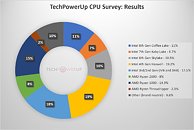
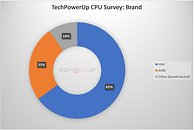
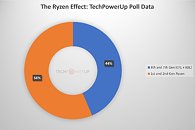
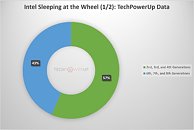
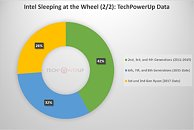

96 Comments on TechPowerUp Processor Survey Results: The Ryzen Effect is Real
Sure it's 2012 tech, but value for money with OC & gaming at 1080P/60hz, they are within reach of most budget inclined OC enthusiasts & have been for some 5 yrs b4 Ryzen revolution.
But what does "other" mean? it appears to be anything other than 2 - 8 gens Intel platforms or new Ryzen stuff.
Some of us have 1st gen i7 or even older LGA775 platform for gaming or other uses.
Wish TPU surveys in future would consider ALL of the enthusiasts market & not selected lines of cpus. At least going back a decade imo.
Browsing on sites like ebay indicates these older platforms are still actively being traded.
Because a TPU member is not up with the latest n' greatest OC masterpieces does not mean they are not enthusiast or OC inclined.
Just my 2 cents. :)
This computer is like trigger's broom except for the processor. I've been through cases, hard drives, GPUs, ram and one motherboard but the CPU remains.
I don't want to go with 2700x because I don't want to spend $100 more on a processor that will be replaced by Ryzen 2.
I know AMD fans scream from the mountains about how much multi-threaded power the Ryzen six & eight cores have and the single threaded performance is "good enough" but you can make the same argument for an OC Intel's quad and/or i5-8400 with great single core performance and "good enough" multi-core performance for most people.
In "real world" most people don't care about what inside a PC until it dead or struggles then trying to display Facebook photos. In real world people upgrading C2D or FX4xxx to FX8xxx or 4-6th gen Pentiums to Ryzen 1200/1600, or staying on 1-2 gen I7 (thanks to Chinese Xeons).
I consider buying Ryzen or Threadripper (4 ch RAM and plenty of full x16(8) slots) since launch day, but first was RAM flaws and heavily inflated prices (waiting for a good deal, cause 64-128GB would be half of cost of a new system if not more), now it has refresh and especially refresh motherboards needed to get full auto OC potential (AMD told us something a bit different about this platform, technically you can use "old" mobo with refresh CPU, but you will never willing to do), next year we get new refresh (i mean new CPU, but) with maybe doubling cores count in desktop and HEDT segments (me currently waiting for this, and i think it will need new board or new revision - more cores = more consumption). Refresh every year means, people buying something for next 3+ years waiting for most powerful thing to be released.
Our Lenovo rep was not so happy when I asked for Ryzen builds. And the answer was it’s coming soon. I am pushing procurement to wait for Ryzen. Bottom line is once people start realizing AMD is back, B2B will switch. Because management and procurement teams are not tech people who log into tech news sites like TechPowerUp fudzilla
To save money, that's why they are still in the market because their low prices otherwise they would be already extinct.
a) With GFX card segment having been stagnant and high priced for so long, many people just held off doing new builds.
b) For those whose usages or leanings favor Intel, there has been no reason to upgrade ... Sandy Bbridge even is still a viable processor.
c) For those whose usages or leanings favor AMD, there is now significant reason to upgrade .
Right now to my eyes, not a lot of reason to upgrade anything ... but at this point ...
... For workstations, we still like / recommend Intel
... For gaming boxes, we still like / recommend Intel
... For boxes that need to do a significant amount (30% or more) of both, we like / recommend Ryzen